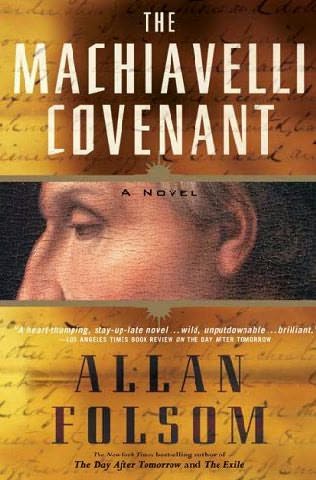
Another Da Vinci impersonation, Folsom's book is at least entertaining. I should state that I listened to this book - and the previous entry - while driving down to Boston. They seemed like fast paced action thrillers that would keep my attention through the underpopulated but heavily wooded mountains of Vermont and New Hampshire. The third translation, as previously stated, was a piece of crap. The Machiavelli Covenant was a bit better; nonetheless, it furthered my view that Da Vinci code is the best piece of crap Hollywoodesque book ever. Let me explain.
Da Vinci code has three characteristic that set it apart from these imitations : 1) although not exactly a shinning examples of prose, it is not badly written; 2) the action is relentless and fast paced - this is an absolute must, since the story, taken on it's own, would be utterly hokey and laughable - the extremely fast pace of the novel doesn't give you time to laugh out loud; and 3) finally the subject matter is well known and important to many readers.
Now, let's consider the Machiavelli Covenant on each of these points. To start, a brief description of the plot. Niccollo Machiavelli is a 16th Century Philosopher who write a book on political control called "The Prince". As it turns out (according to Folsom), an addendum to the book set up a despotic world order through which absolute control could be achieved through political deception. This "Covenant" has existed for over 500 years and is now set to take over - they include the highest ranking US and world officials. All but the President of the US are involved and they are set to murder the leaders of France and Germany. The President is abhorred at this plan and escapes to meet up with Nicholas Marten, who is already on the trail of this sinister plot. Together, the 2 must attempt to stop a plan to launch a biological attack on the Arab countries.
Doesn't it sound so exciting? Well, let's review. For one thing, it is not so well written. Reading reviews on Amazon, I noticed that many commented on the poor editing and writing - I had actually thought the same thing and I didn't even read the book. You know it's problematic when you can "hear" editing mistakes.
Secondly, the action is not so very fast paced. Granted it is much faster than "The Third Translation", it is hardly the "rocket ride" that some critics have said of it. More of a rough ride down a dry slide then a greased up Chevy Chase toboggan.
On the third level of comparison to Da Vinci Code, the subject matter could hardly be more obscure. Does the average reader know who Machiavelli is? Perhaps it is my snobbishness coming in, but I would say no. Da Vinci works because even the most devout Buddhist knows who J.C. is. Not the case for our friend Niccollo.
All in all, perhaps I have been too harsh. The book is enjoyable and reads fairly easily and quickly. But it hardly inspires me to read the sequel, which undoubtedly will be released shortly.
No comments:
Post a Comment